“I’m wondering where in the world Alicia Keys could be, I been looking for her even clean through Tennessee.” Dylanologists, get your pencils ready: Word is Bob namedrops Alicia Keys on the first track of his new album, Modern Times, due out August 29.
Category: Bob Dylan
The Times They Are A-Changin’.
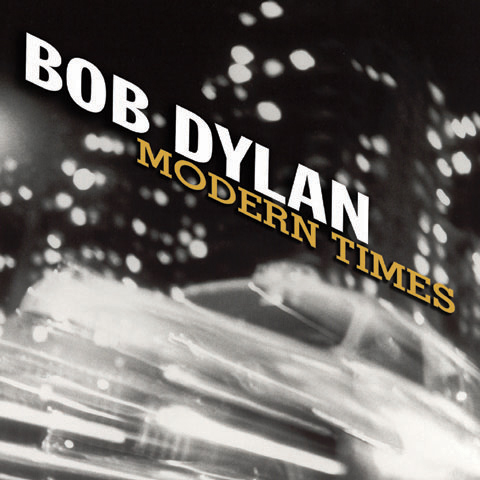 I’m a bit late in hearing this excellent news: Bob Dylan’s 44th album, Modern Times (and his first album of original material since Love & Theft, released on 9/11) comes out next month: August 29, to be exact. Tracks include “Thunder on the Mountain,” “Spirit on the Water,” “When the Deal goes Down,” and “Beyond the Horizon.”
I’m a bit late in hearing this excellent news: Bob Dylan’s 44th album, Modern Times (and his first album of original material since Love & Theft, released on 9/11) comes out next month: August 29, to be exact. Tracks include “Thunder on the Mountain,” “Spirit on the Water,” “When the Deal goes Down,” and “Beyond the Horizon.”
Forever Young.
Salute him when his birthday comes…a very happy 65 to the freewheelin’ Bob Dylan. May your heart always be joyful, may your songs always be sung. Update: My fellow Americans: The State of the Dylan is strong.
Don’t Look Back.
According to Dark Horizons, Heath Ledger will replace Colin Farrell as Bob Dylan in Todd Haynes’ forthcoming Bob biopic I’m Not There. Purportedly also playing Dylan in the film are Christian Bale, Cate Blanchett, Charlotte Gainsbourg, Richard Gere, and Julianne Moore.
Settin’ my dial on the radio.
“Don’t call it a comeback, he been here for years, rocking his peers, putting ’em in fear, making tears rain down like a monsoon, explosions overpowerin’, over the competition LL Cool J is towering. LL Cool J — stands for Ladies Love Cool J.” On the eve of the premiere of his new XM “Theme Time Radio Hour” (which premieres Wednesday,) Bob Dylan shares some of his early show playlists (organized around themes such as the weather, mothers, drinking, and cars) and his on-air comments about some favorite selections.
Lay Down Your Weary Tunes.
Also in music news, the freewheelin’ Bob Dylan is in the studio working on his 31st studio album (and the follow-up to 2001’s Love and Theft.) “Work…began early this month with four days of rehearsals with his touring band at the Bardavon 1869 Opera House in Poughkeepsie, New York. The crew have now moved to Manhattan to record the songs.” And, for the Springsteen fans out there, the story also reports that the Boss is currently cutting an album of Pete Seeger covers, The Seeger Sessions.
Love Songs ’06.
Happy Valentine’s Day. In keeping with a GitM tradition started last year, and since y’all out there, dear readers, are once again my Valentines for the day whether you like it or not (I long ago stopped delving into personal detail around these parts — Suffice to say that, my fellow Americans, the State of the Love Life is, um, not good. In fact, like those pesky WMD, its existence has been almost entirely theoretical for some time…Ah, well.) — I’ve thrown up more tunes for your holiday perusal. At any rate, as per the usual mp3blog rules: the files will be only up for a day or two, right-click to save them, and please don’t link to them directly. Otherwise, enjoy!
Stare at the TV screen
I don’t know what to do
I need a rendezvous
For sundry reasons involving the Internet Age, Kraftwerk’s “Computer Love” has taken on all kinds of ulterior meanings since it first debuted on 1981’s Computer World, when 300 baud modems (“I call this number for a data date“) and TRS-80s operating on tape decks were the order of the day. When these German electronica pioneers weren’t creating the music of the future, it seems, they were presciently anticipating our current era of Instant Messaging, online dating sites, and the like. Still, its newer resonances notwithstanding, I’ve always found something giddily innocent about this track. While the lyrics suggest a much more downbeat affair, the chirps and whistles in this song never fail to bring a big goofy grin to my face — particularly in this clubbier 1991 remix version, when those syncopated synths take off like a bird in flight. There are some songs that just make ya happy, no matter what — for me, this is one of those.
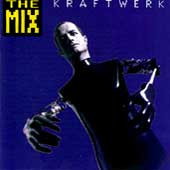
Computerlove — Kraftwerk (6.2MB, 6:37)
(song removed)
From The Mix.
[Update:]
And it feels like home
And there’s someone
Calling on the telephone
Let’s stay home
It’s cold outside
And I have so much
To confide to you
As I’ve wrote in this review of Ultra years ago, Depeche Mode is a band that’s been misunderstood and misunderestimated by a lot of people here in America. Which is not to say they’re some hidden secret — obviously, they’re one of the biggest bands in the world, and have had a huge US following for decades now.
Still, even today, in the reviews of DM’s recent Playing the Angel, rock critics trod out the doom-and-gloom “Depressed Mode” copy that’s been circulating since at least 1986’s Black Celebration. But they miss the point. Very few DM songs — Ok, “Satellite,” from A Broken Frame is one — are out-and-out depressing in the way, say, most Nine Inch Nails songs are. Rather, almost all of the songs on Black Celebration, one of my Desert Island discs, work in the same groove, including this one, “Here is the House.” As one review of “Enjoy the Silence” summed it up, it’s “me and you against the world.”
Yes, Celebration argues, this earth can be a cruel, unrelenting place, filled with misfortune and disappointment. But, maybe, just maybe, you and I can rise above all that, and together light a candle that’ll warm us both through another unforgiving night. In sum, DM’s best romantic ballads aren’t depressing so much as poignant and ever-so-slightly hopeful. I’ll be the first to admit that the band has come close to over-mining this particular mode after 25 years, but still, when they do it right, it’s a thing of beauty. (Also, since I’m sure a lot of people out there already have this song in their collection, I’ve also posted Martin’s early demo version, which actually fits the song really well in a lo-fi Magnetic Fields kinda way.)

Here is the House — Depeche Mode (4.1MB, 4:19)
Bonus Track: Here is the House (Demo) — Martin Gore (4.3MB, 4:35)
(songs removed)
Original version on Black Celebration.
[Update:]
running through my veins
the blood of eden keeps rushing through me
when I’m sure there’s none that remains
I had a hard time figuring out which song I wanted to post from Peter Gabriel’s sublime rumination on romance, Us (1992), ’cause almost every song — particularly on the A-side — is a certifiable classic. (A younger friend of mine once musically conflated Gabriel’s oeuvre with that of his Genesis bandmate Phil Collins, which almost drove me to apoplexy. I mean, I don’t hate Phil Collins or anything, but, c’mon now — Gabriel is a lot more than just “Sledgehammer,” and even “Sledgehammer” isn’t “Susudio.”)
In the end, I opted for this cut of “Blood of Eden” from Wim Wender’s Until the End of the World (which for some odd reason was left off that otherwise great soundtrack.) The Us version is disarmingly beautiful, but the lack of Sinead O’Connor’s backing vocals here lend the track a different resonance.
On the album, you can actually hear “the union of the woman and the man” in O’Connor and Gabriel’s lush harmony, but here, with Gabriel plaintive and alone, it’s just a fading memory, the echo of happier times. And yet, at certain moments (such as in the bridge), the memories come flooding back. “The blood of eden keeps rushing through me, when I’m sure there’s none that remains.” With love in the rear-view mirror, disappearing over the horizon, Pete still has the echoes of the past to keep him keepin’ on.

Blood of Eden (Wim Wenders Version) — Peter Gabriel (6.2MB, 6:40)
(song removed)
From Blood of Eden (Single).
[Update: The Wim Wenders version is hard to find on the tubes, but below is the original version with Sinead O’Connor.]
It’s well understood,
Most of the time
I wouldn’t change it if I could,
I can’t make it all match up, I can hold my own,
I can deal with the situation right down to the bone,
I can survive, I can endure
And I don’t even think about her
Most of the time.
Speaking of which, nobody does keep-on-keepin’-on like its coiner, the inimitable Bob Dylan. From “Don’t Think Twice” to “Like a Rolling Stone” and Blood on the Tracks to Time out of Mind, one of Bob’s career trademarks has been the post-mortem relationship song. Some are angry and vindictive, some are haunted, some are jaunty and could care less, some are resigned and reflective, some are (love)sick with remorse and regret. There are so many great songs that could have gone here, but I ended up choosing “Most of the Time,” from the somewhat underappreciated Oh Mercy (1989), the forerunner to Dylan’s recent revival. In this song, Bob’s basically got his act together and has moved on from an old love…most of the time. In direct contrast to Gabriel in “Eden,” the past here is treacherous. (“Most of the time, I can’t even be sure, if she was ever with me or if I was ever with her.“) Dylan’s learned to live with his scars, but at any moment — a passing haircut, a fleeting remembrance, a scent of perfume in the air — and he is undone once again, as if it were yesterday. After all, even for a guy like Bob Dylan, who once seemed to carry the weight of the world as if it were nothing, you don’t get very far in life without some ghosts in the machine.

Most of the Time — Bob Dylan (4.5MB, 5:03)
(song removed)
From Oh Mercy.
[Update:]
Ok, hopefully five tunes won’t kill my bandwidth…Have a safe and happy Valentine’s Day out there, y’all. (And, as a side note, if you’re looking for more quality music, be sure to check out the splendiferous Fluxblog almost-daily, and don’t miss out on the Max Music Mixes every month at Lots of Co.)
The Last Radio is Playing.
Johnny’s in the basement mixing up the medicine, and Bob’s in…the DJ booth? Apparently Dylan will host his own show on XM Radio beginning in March. “Dylan will offer regular commentary on music and other topics, host and interview special guests including other artists and will take emails from XM subscribers.”
Understand Your Man.
 While there’s no one hard and fast rule to a good artist biopic (and, indeed, last week’s Capote belies to some extent what I’m about to say), it should capture what’s innovative and idiosyncratic about its subject, and help to explain why we should care about their artistry. And, while James Mangold’s reasonably entertaining Walk the Line has its moments, and Joaquin Phoenix and Reese Witherspoon are both excellent, I ultimately found this movie somewhat frustrating. For, except for occasional flashes, the movie, I think, misses the chance to do Johnny Cash justice — you never really get a sense of what was so unique and extraordinary about him. And, even considered solely as the romance of the Man in Black and his long-suffering muse, June Carter (of the fabled Carter Family,) Walk the Line stumbles ever so slightly. If you came into this film knowing nothing about Johnny Cash or June Carter Cash, I’m not sure this movie makes their case. Too often, it follows a standard Behind the Music “rise, drug-addled-fall, and rise again” structure, which makes it feel like it could be about, well, anybody.
While there’s no one hard and fast rule to a good artist biopic (and, indeed, last week’s Capote belies to some extent what I’m about to say), it should capture what’s innovative and idiosyncratic about its subject, and help to explain why we should care about their artistry. And, while James Mangold’s reasonably entertaining Walk the Line has its moments, and Joaquin Phoenix and Reese Witherspoon are both excellent, I ultimately found this movie somewhat frustrating. For, except for occasional flashes, the movie, I think, misses the chance to do Johnny Cash justice — you never really get a sense of what was so unique and extraordinary about him. And, even considered solely as the romance of the Man in Black and his long-suffering muse, June Carter (of the fabled Carter Family,) Walk the Line stumbles ever so slightly. If you came into this film knowing nothing about Johnny Cash or June Carter Cash, I’m not sure this movie makes their case. Too often, it follows a standard Behind the Music “rise, drug-addled-fall, and rise again” structure, which makes it feel like it could be about, well, anybody.
To its credit, the film starts off well — We begin on a chilly day outside Folsom Prison in 1968, as a guard nervously listens to an ominous throb emanating from and through the high, grey walls. Slowly, it resolves into a readily identifiable Cash backbeat, and we go inside to find the Man in Black’s band waiting for him to take the jailhouse stage. But Cash is lost in reverie, struck by the sight of a buzzsaw blade in the prison shop room. For a soon-to-be-obvious reason, it takes him back to his boyhood days picking cotton in rural Arkansas, where the sounds of trains going someplace else are always in the distance, and the only respite from the sweltering heat is the voice of young June Carter on the radio. Ok, so far, so good…Mangold has shown that he’s not afraid to keep everything a little impressionistic, to color his palette with iconographic Cash-isms and help the man’s music breathe through the picture.
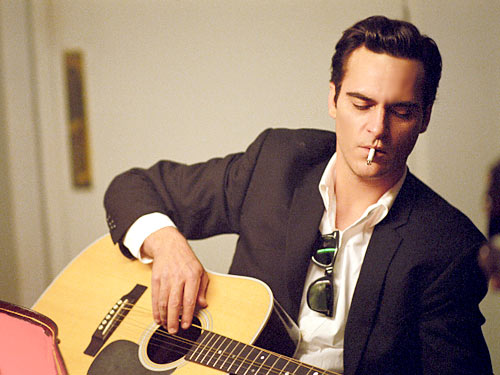 Unfortunately, though, most of the film thereafter feels depressingly literal. After apprising us of a childhood tragedy, the film takes us through Cash’s early days in the Air Force, his increasingly loveless first marriage to Vivian Liberto (Ginnifer Goodwin, looking like Audrey from Twin Peaks and feeling like a stock biopic trope), his rise to fame, his subsequent addiction to Go Pills, and his ultimate redemption thanks to a good-hearted woman, always there to help out a good-timin’ man in his hour(s) of need. This is all capably handled, I guess, but too often it feels rote, in an Insert-Rock-Star-Here kinda way. Worse, aside from one discerning monologue by rock-n-roll impresario Sam Phillips (Dallas Roberts) at Cash’s first audition, the film never really gets to the bottom of the singer’s appeal. We see Cash on his all-star Sun Records tours — and thus get impersonations of Elvis Presley, Jerry Lee Lewis, Roy Orbison, and Carl Phillips, among others — but the film never explains what was unique about Cash among Phillips’ impressive stable of talent. (No Dylan here later on, though…but Cash’s close friendship with Bob is explicitly referenced several times, including a timely cover of “It Ain’t Me, Babe” and a lively use of “Highway 61“‘s police whistle intro.)
Unfortunately, though, most of the film thereafter feels depressingly literal. After apprising us of a childhood tragedy, the film takes us through Cash’s early days in the Air Force, his increasingly loveless first marriage to Vivian Liberto (Ginnifer Goodwin, looking like Audrey from Twin Peaks and feeling like a stock biopic trope), his rise to fame, his subsequent addiction to Go Pills, and his ultimate redemption thanks to a good-hearted woman, always there to help out a good-timin’ man in his hour(s) of need. This is all capably handled, I guess, but too often it feels rote, in an Insert-Rock-Star-Here kinda way. Worse, aside from one discerning monologue by rock-n-roll impresario Sam Phillips (Dallas Roberts) at Cash’s first audition, the film never really gets to the bottom of the singer’s appeal. We see Cash on his all-star Sun Records tours — and thus get impersonations of Elvis Presley, Jerry Lee Lewis, Roy Orbison, and Carl Phillips, among others — but the film never explains what was unique about Cash among Phillips’ impressive stable of talent. (No Dylan here later on, though…but Cash’s close friendship with Bob is explicitly referenced several times, including a timely cover of “It Ain’t Me, Babe” and a lively use of “Highway 61“‘s police whistle intro.)
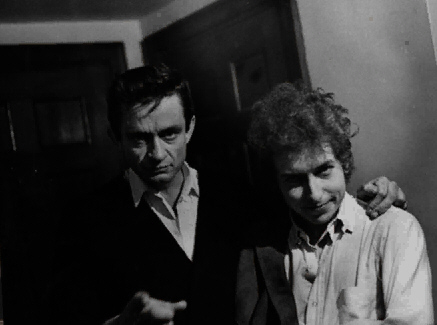 In fact, allow me to digress — one of the many fascinating aspects of the Dylan-Cash camaraderie (also briefly featured in one of the most memorable moments of the recent No Direction Home) is that, aside from a shared affinity for murder ballads and mind-altering substances, they were a study in contrasts, at least in the Sixties. Often, the young Dylan seems impetuous and invincible. Keenly aware of injustice, he nevertheless remains unfazed. He’s unrepentant in his anger — To paraphrase Herbert Croly‘s colorful description of Theodore Roosevelt, the early Dylan wields righteousness like a hammer, throwing the sins, taunts, and ridicule of this world right back from whence they came. Or, at many of his best moments, he turns his back on it all. Instead, he illuminates our experience by imagining the world anew, conjuring a landscape (what Greil Marcus has called the “invisible republic”) that renders both grievous sins and exalted sacraments to be often socially conditional, if not absurd and irrelevant.
In fact, allow me to digress — one of the many fascinating aspects of the Dylan-Cash camaraderie (also briefly featured in one of the most memorable moments of the recent No Direction Home) is that, aside from a shared affinity for murder ballads and mind-altering substances, they were a study in contrasts, at least in the Sixties. Often, the young Dylan seems impetuous and invincible. Keenly aware of injustice, he nevertheless remains unfazed. He’s unrepentant in his anger — To paraphrase Herbert Croly‘s colorful description of Theodore Roosevelt, the early Dylan wields righteousness like a hammer, throwing the sins, taunts, and ridicule of this world right back from whence they came. Or, at many of his best moments, he turns his back on it all. Instead, he illuminates our experience by imagining the world anew, conjuring a landscape (what Greil Marcus has called the “invisible republic”) that renders both grievous sins and exalted sacraments to be often socially conditional, if not absurd and irrelevant.
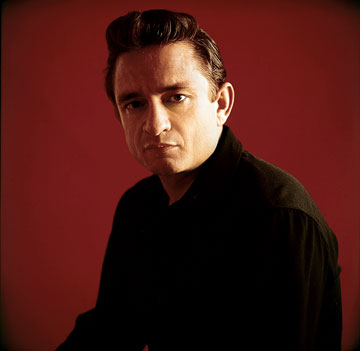 But Cash — Cash can’t escape his critics, because his worst critic is himself. Nor can he either simply condemn or intricately reimagine Evil, because he has been Evil’s instrument. He’s a man of our world — In fact, he’s the Last Man, the Fallen Man. (“But just so we’re reminded of the ones who are held back, Up front there ought ‘a be a Man In Black.”) Forget righteousness: Cash’s characters are just as cognizant of injustice as Dylan’s, but they also know they’ve done wrongs that can’t and never will be forgiven. They’ve been living desperate for so long they’ve become resigned to it. They walk the line, because they know what it’s like to stray far off the path, and they’ve paid the price in spades. And their adherence to their creed — be it a woman, the Savior, or something else, depending on the song — is all the more heartfelt and admirable because it has been tested, and even broken. In short, Cash has suffered grave consequences, and persevered in spite of them. He’s been through the Ring of Fire and out the other side, and his gravelly-delivered tales of guilt and penitence have set the stage for any number of later artists, including Tom Waits, Nick Cave, Leonard Cohen, and, by no coincidence at all, the older Bob Dylan.
But Cash — Cash can’t escape his critics, because his worst critic is himself. Nor can he either simply condemn or intricately reimagine Evil, because he has been Evil’s instrument. He’s a man of our world — In fact, he’s the Last Man, the Fallen Man. (“But just so we’re reminded of the ones who are held back, Up front there ought ‘a be a Man In Black.”) Forget righteousness: Cash’s characters are just as cognizant of injustice as Dylan’s, but they also know they’ve done wrongs that can’t and never will be forgiven. They’ve been living desperate for so long they’ve become resigned to it. They walk the line, because they know what it’s like to stray far off the path, and they’ve paid the price in spades. And their adherence to their creed — be it a woman, the Savior, or something else, depending on the song — is all the more heartfelt and admirable because it has been tested, and even broken. In short, Cash has suffered grave consequences, and persevered in spite of them. He’s been through the Ring of Fire and out the other side, and his gravelly-delivered tales of guilt and penitence have set the stage for any number of later artists, including Tom Waits, Nick Cave, Leonard Cohen, and, by no coincidence at all, the older Bob Dylan.
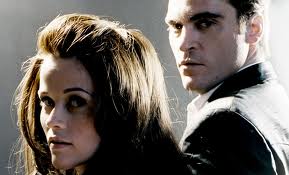 Well, that’s my take on Cash, and there are many others (For example, Ed Champion had a nice read on him last week contrasting Cash with Franz Ferdinand.) But, back to the movie — I barely got any sense of a Cash critique at all in Walk the Line. At best, it assumes you already have an opinion and appreciation of the man coming in, which may be true but still seems like lazy writing. (Or, alternatively, I guess you could say that it attempts to explode the Cash myth — “He wasn’t really a jailbird!” — but that gets us back into staid Behind the Music territory again.) That being said, the fault with the film is not Joaquin Phoenix’s by any means. Admittedly, his singing voice is off — although, whether it be to his getting better or my brain sorting out the cognitive dissonance — he improves as the film goes along. But, otherwise, Phoenix goes for it, and despite often seeming physically and vocally far afield from Cash, he delivers a powerful performance from the inside-out. As Dave Edelstein noted, it’s hard to watch him wrestle with drug abuse and the memory of his dead brother here and not think of River Phoenix. (If anything, I was reminded of Anthony Hopkins in Oliver Stone’s Nixon, which is another brilliant performance, although arguably one that doesn’t suggest Tricky Dick to anyone who remembers him.)
Well, that’s my take on Cash, and there are many others (For example, Ed Champion had a nice read on him last week contrasting Cash with Franz Ferdinand.) But, back to the movie — I barely got any sense of a Cash critique at all in Walk the Line. At best, it assumes you already have an opinion and appreciation of the man coming in, which may be true but still seems like lazy writing. (Or, alternatively, I guess you could say that it attempts to explode the Cash myth — “He wasn’t really a jailbird!” — but that gets us back into staid Behind the Music territory again.) That being said, the fault with the film is not Joaquin Phoenix’s by any means. Admittedly, his singing voice is off — although, whether it be to his getting better or my brain sorting out the cognitive dissonance — he improves as the film goes along. But, otherwise, Phoenix goes for it, and despite often seeming physically and vocally far afield from Cash, he delivers a powerful performance from the inside-out. As Dave Edelstein noted, it’s hard to watch him wrestle with drug abuse and the memory of his dead brother here and not think of River Phoenix. (If anything, I was reminded of Anthony Hopkins in Oliver Stone’s Nixon, which is another brilliant performance, although arguably one that doesn’t suggest Tricky Dick to anyone who remembers him.)
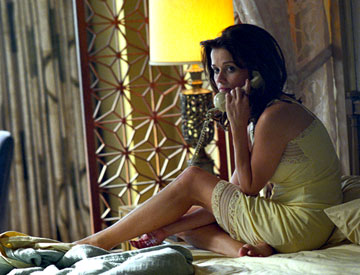 Reese Witherspoon is also superb (indeed, award-worthy) as June Carter, who, as in life, I suppose, was both a vivacious stage presence and a model of forbearance. (It’s also great to hear a genuine, unaffected southern accent onscreen. Too often, they sound actorly and are off by hundreds of miles — I’m looking at you, Cold Mountain.) But, the romance at the heart of the film is missing that certain je-ne-sais-quoi. From what little I know about it, Johnny and June Carter Cash are one of those love stories for the ages. She was his angel, his ray of light in the dark (images which the film does try to bring to life.) But, here, and I’m not quite sure exactly who’s at fault, Johnny Cash just comes off as a disciple of the mega-creepy Anakin Skywalker school of courting — i.e., act like a stalker for long enough and eventually she’ll come ’round. Again, I don’t really blame the actors. They do what they can with what they’ve got (although perhaps memories of Phoenix’s turn as Gladiator‘s Commodus are partially at fault.) But, to my mind, if the movie tried harder to sell us on Cash’s unique artistry, perhaps we’d have a better sense of what June, daughter of an estimable clan of folkies, saw in him. As it is, he just seems like an extremely lucky, albeit talented, amphetamine junkie.
Reese Witherspoon is also superb (indeed, award-worthy) as June Carter, who, as in life, I suppose, was both a vivacious stage presence and a model of forbearance. (It’s also great to hear a genuine, unaffected southern accent onscreen. Too often, they sound actorly and are off by hundreds of miles — I’m looking at you, Cold Mountain.) But, the romance at the heart of the film is missing that certain je-ne-sais-quoi. From what little I know about it, Johnny and June Carter Cash are one of those love stories for the ages. She was his angel, his ray of light in the dark (images which the film does try to bring to life.) But, here, and I’m not quite sure exactly who’s at fault, Johnny Cash just comes off as a disciple of the mega-creepy Anakin Skywalker school of courting — i.e., act like a stalker for long enough and eventually she’ll come ’round. Again, I don’t really blame the actors. They do what they can with what they’ve got (although perhaps memories of Phoenix’s turn as Gladiator‘s Commodus are partially at fault.) But, to my mind, if the movie tried harder to sell us on Cash’s unique artistry, perhaps we’d have a better sense of what June, daughter of an estimable clan of folkies, saw in him. As it is, he just seems like an extremely lucky, albeit talented, amphetamine junkie.
And, to close an overextended review, that’s the basic problem with Walk the Line. The parts are all here, but, aside from the occasional flicker of life, the soul of Cash is mostly absent. Perhaps it’d be impossible to do right by him, to capture all the mystique of his music and his persona on celluloid. But, that doesn’t make this film any less frustrating. Try as Walk the Line might, the elusive and unforgettable Johnny Cash remains a ghost rider in the sky.
…For that home across the road.
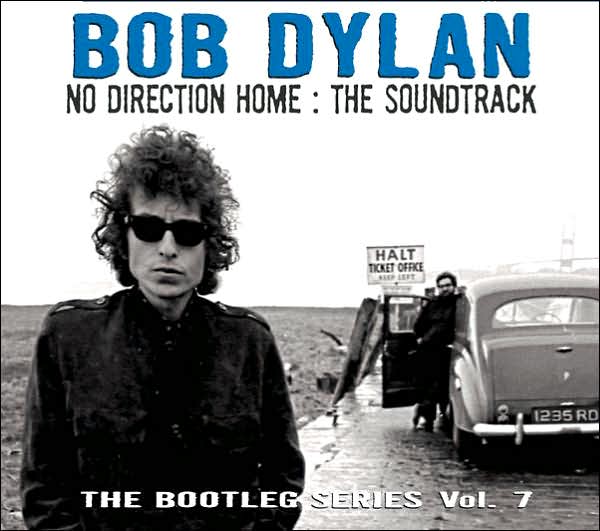 Just a reminder: Bob Dylan: No Direction Home, the Martin Scorsese-assembled documentary that’s been getting middling to great reviews, premieres tonight on PBS at 9pm (check local listings.)
Just a reminder: Bob Dylan: No Direction Home, the Martin Scorsese-assembled documentary that’s been getting middling to great reviews, premieres tonight on PBS at 9pm (check local listings.)
